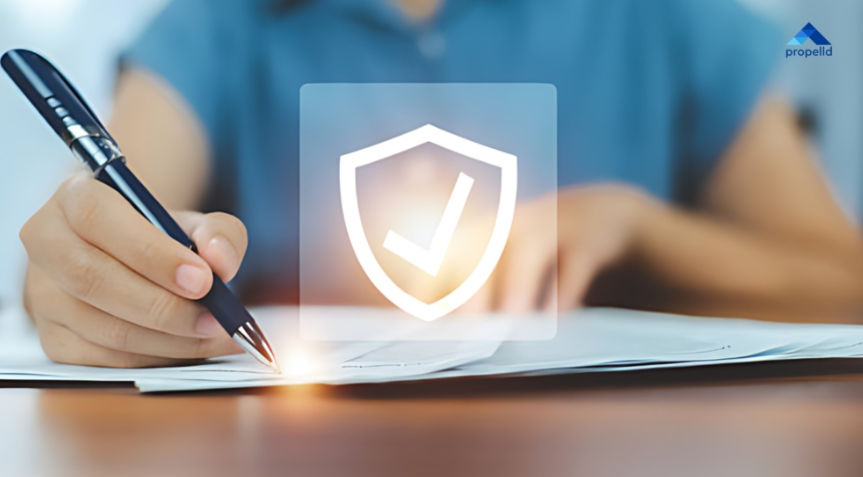Secured loans, which require collateral such as property, gold, or vehicles, offer borrowers lower interest rates and higher loan amounts compared to unsecured loans. For instance, loans against gold have seen a significant surge, with a 68% increase in the first nine months of FY2025, compared to 12.7% in the same period the previous year.
Read on to explore secured loans, their benefits, eligibility, and how to use them effectively in 2025.
What Are Secured Loans?
Secured loans are financial products that require the borrower to pledge an asset, such as a home, vehicle, or gold, as collateral. This arrangement offers lenders a safety net wherein, if the borrower defaults, the lender has the right to claim the collateral to recover the loan amount. For borrowers, this typically translates to lower interest rates and higher borrowing limits compared to unsecured loans.
Key Advantages and Features of Secured Loans
Secured education loans have become a vital tool for Indian students aiming to pursue higher education in India and abroad. According to the Ministry of Education (MoE) report, about 4% of higher education students in India opt for education loans overall.
Below are some of the top advantages of secured borrowing:
1. Lower Interest Rates
Secured education loans typically offer lower interest rates compared to unsecured education loans. For example, as of 2024, banks in India offer rates starting from 9–10% per annum for secured loans.
2. Higher Loan Amounts
Students can access larger loan amounts through secured education loans because the collateral reduces risk for lenders. Loans for studies in India can go up to INR 50 lakh, while loans for overseas education can range from ₹7.50 lakh–3 crores, depending on the institution and course.
3. Flexible Repayment Options
Secured education loans often come with flexible repayment plans. Many banks provide a moratorium period that covers the course duration plus 6–12 months after graduation, allowing students to focus on studies before starting repayments. This reduces financial stress immediately after completing their education.
4. Easier Approval Process
Since the loans are backed by collateral, banks are more likely to approve applications, even for students with limited credit history.
Minimal Docs, Maximum Approval - Apply Now.
How Secured Education Loans Function in India?
To understand secured education loans, it’s useful to compare them with unsecured loans. Unsecured loans do not require collateral, and lenders rely primarily on your credit score and financial history. If you default, the lender has limited options to recover the money, and your credit score takes the hit.
Secured loans, on the other hand, are backed by collateral such as property, fixed deposits, or other assets. The collateral reduces the lender’s risk, which often allows borrowers to access larger amounts at lower interest rates. If you fail to repay, the lender can claim the property and sell it to recover some or all of the outstanding amount.
Explore Banks That Give Education Loans without Collateral for Abroad to see options if you’re looking for hassle-free funding for studies overseas.
Types of Secured Loans
Secured loans come in various forms, each designed to meet specific financial needs while using an asset as collateral. From financing higher education and buying vehicles to leveraging property and life insurance, secured loans offer flexible options tailored to different goals.
Below is an overview of the most common types of secured loans:
1. Secured Personal Loans
These loans are backed by assets like fixed deposits, gold, or vehicles. They are typically used for personal expenses such as home renovations, medical bills, or debt consolidation. Secured personal loans often offer lower interest rates compared to unsecured loans due to the reduced risk for lenders.
2. Secured Business Loans
Business owners can secure loans by pledging assets like commercial property, machinery, or inventory. These loans are used to fund business expansion, purchase equipment, or manage cash flow. The collateral provides lenders with assurance, enabling businesses to access larger loan amounts at competitive interest rates.
3. Secured Car Loans
Car loans are secured by the vehicle being financed. If the borrower defaults, the lender has the right to repossess the car. These loans typically offer lower interest rates and longer repayment periods compared to unsecured personal loans.
4. Loans Against Property (LAP)
In this arrangement, individuals pledge residential or commercial property as collateral to access substantial funds. Collateral loans on property are often used for business purposes, education, or medical expenses. They generally offer more favourable terms, notably lower interest rates, compared to unsecured loans. According to recent data, a higher credit score and stable income generally lead to better rates for LAPs.
5. Life Insurance Loans
Policyholders can borrow against the cash value of their life insurance policies. These loans are typically used for emergencies or to cover short-term financial needs. The interest rates are generally lower than credit card rates, and the repayment terms are flexible.
6. Home Equity Loans
Homeowners can borrow against the equity in their property. These loans are often used for home improvements, debt consolidation, or major expenses. The loan amount is determined by the difference between the home's market value and the outstanding mortgage balance. Home equity loans usually offer lower interest rates and longer repayment periods.
7. Secured Education Loans
Secured education loans are for students to fund higher education in India or abroad, backed by collateral such as parental property or fixed deposits. Borrowers can access larger loan amounts, with some institutions offering loans up to ₹3 crore for studies abroad and ₹50 lakh for domestic education, based on the strength of the collateral and the student's financial profile.
For more details on leveraging property to fund higher studies, check out Education Loan Against Property, which offers a complete guide for students and parents.
Get an Education Loan with Higher Chances of Approval.
Assets You Can Pledge as Collateral for a Secured Loan
When applying for a secured loan, the type of collateral you offer plays an important role in determining the loan amount, interest rate, and approval process. Different lenders may accept different types of assets, and the value and liquidity of the collateral often affect the terms of the loan.
The table below provides a detailed overview of common collateral types used for secured loans:
Differences Between Secured and Unsecured Loans
When considering borrowing options, it's crucial to understand the distinctions between secured and unsecured loans. These two types of loans differ primarily in the requirement of collateral, which significantly impacts interest rates, loan amounts, and approval processes.
Here’s a table with a comparative overview of secured vs. unsecured loans:
For a deeper comparison, check out our detailed guide on Secured vs Unsecured Education Loans to understand which option suits your needs best.
How to Choose the Right Secured Loan Lenders?
When searching for a secured loan, consider the type and value of collateral, your credit and income stability, interest rates, and the lender's reputation. Below are some of the key factors to consider:
1. Collateral Requirements
Lenders typically accept assets like residential or commercial property, fixed deposits, gold, or life insurance policies as collateral. The value of the collateral often determines the loan amount you can access. For instance, loans against property (LAP) can offer amounts up to ₹3 crore, depending on the property's value and the borrower's financial profile.
2. Interest Rates
Secured loans generally offer lower interest rates compared to unsecured loans due to the reduced risk for lenders. For example, loans against property in India typically have interest rates ranging from 9% to 12%, depending on factors like credit score, loan amount, and tenure.
3. Interest Rate Type
Interest rates on secured loans can be either fixed or floating. Fixed rates remain constant throughout the loan tenure, providing predictable monthly payments. Floating rates, on the other hand, can change based on market conditions, potentially affecting your monthly repayments.
4. Credit and Income Requirements
While secured loans are more accessible than unsecured ones, lenders still assess your creditworthiness and income stability. A higher credit score (preferably above 750) and a stable income can lead to better loan terms. Lenders often use the Fixed Obligation to Income Ratio (FOIR) to evaluate your repayment capacity.
5. Fees
Be aware of additional fees that may apply, such as processing fees, prepayment charges, and legal charges. These fees can vary between lenders and should be factored into your overall loan cost.
6. Loan Term
The tenure of secured loans can range from 5 to 20 years, depending on the loan amount and the borrower's profile. Longer tenures can result in lower monthly repayments but may increase the total interest paid over the loan's life.
7. Loan Limits
The loan amount you can borrow is often determined by the value of the collateral and your repayment capacity. For instance, loans against property can offer up to 60-70% of the property's market value, subject to lender policies.
8. Lender Reputation
It's essential to choose a lender with a strong reputation for transparency, customer service, and fair lending practices. Research customer reviews, compare loan offers, and ensure the lender is registered with the Reserve Bank of India (RBI) or other relevant regulatory bodies.
Before applying for a secured education loan, it’s essential to understand the regulations. Get to know the RBI Guidelines for Education Loans in India to ensure your loan application meets all requirements.
Considering a Secured Loan to Rebuild Credit? Here's What You Should Know
Many borrowers wonder if taking a secured loan is a smart move when trying to rebuild credit. Secured loans can offer an opportunity to manage debt and improve your credit score, but it’s important to weigh the pros and cons before moving forward.
Reddit User in r/CRedit shared:
"Secured loan, a good idea? I'm currently trying to rebuild my credit. Would a secured loan for slightly less than what I owe overall be worth it? Would I take a hit when I open the loan?"
Insight: Opening a secured loan can temporarily affect your credit score due to the hard inquiry and new account, but using it to consolidate or pay down higher-interest debt can improve your credit health over time. The key is to ensure that monthly payments are manageable and consistently made on time.
What do we infer from the above case?
- Secured loans can be a strategic tool for rebuilding credit if used responsibly.
- The temporary dip in credit score is often outweighed by timely repayment and reduction of existing high-interest debt.
- Borrowers should carefully compare interest rates, loan amounts, and repayment terms to ensure it genuinely benefits their financial situation.
Tip: If you’re considering a secured loan to rebuild credit, start with a realistic budget, choose a loan amount that you can comfortably repay, and prioritise timely EMIs. This approach can gradually improve your creditworthiness while reducing overall debt.
Consequences of Defaulting on a Secured Loan
Secured loans come with the benefit of lower interest rates and higher loan amounts, but they also carry the responsibility of repayment. Since these loans are backed by collateral, failing to repay can have serious financial consequences.
When a borrower defaults on a secured loan, the following outcomes are common:
1. Collateral Seizure
The lender has the legal right to take possession of the pledged asset. For instance, if you default on a home loan, the bank can initiate foreclosure proceedings and sell the property to recover the outstanding dues.
2. Credit Score Impact
Defaults are reported to credit bureaus, which can significantly lower your credit score. A poor credit score can affect your ability to secure future loans, increase interest rates, or even lead to rejection of loan applications.
3. Legal Action
Lenders can pursue legal remedies to recover the loan amount, which may include filing cases in court. Legal proceedings can add extra costs in the form of fees and penalties.
4. Difficulty in Future Borrowing
A history of default can make it challenging to access credit in the future. Banks may either reject loan applications or approve loans at higher interest rates due to perceived risk.
How to Prevent Default on a Secured Loan?
Here are some practical strategies to avoid default:
1. Assess Your Repayment Capacity
Before applying for a loan, calculate your monthly obligations and ensure that your income can comfortably cover EMIs without straining your finances. Use budgeting tools or loan calculators to plan accurately.
2. Maintain an Emergency Fund
Unexpected expenses, such as medical emergencies or job disruptions, can impact your ability to repay a loan. Keeping a contingency fund covering at least 3–6 months of EMIs can provide a financial buffer.
3. Choose a Loan Suited to Your Needs
Select a loan type, amount, and tenure that align with your financial situation. Longer tenures reduce monthly payments but may increase total interest, while shorter tenures require higher EMIs but lower interest outgo.
4. Stay Informed About Interest Rates
If your loan has a floating interest rate, monitor changes in the market and be prepared for potential fluctuations in your EMI. Consider refinancing if a better rate becomes available.
5. Communicate With Your Lender
If you anticipate difficulty in repayment, contact your lender early. Banks often offer options such as EMI rescheduling, moratoriums, or restructuring to help borrowers manage temporary challenges.
Secured loans remain a viable option for borrowers looking to access larger amounts at lower rates, whether for education, business, or personal goals. By understanding how they work, choosing the right type, and carefully managing collateral and repayments, you can leverage these loans to achieve your financial ambitions without unnecessary risk.
Don’t let financial hurdles hold you back. Propelld offers tailored education loans with fast digital approvals, flexible repayment options, and competitive rates. Propelld offers loans up to INR 50 lakhs and makes borrowing simple and stress-free.
Apply with Propelld and get the funds you need, faster!











.svg)